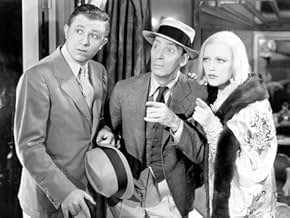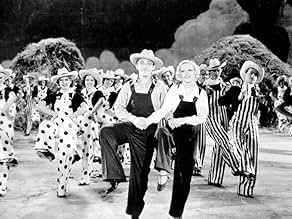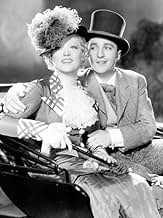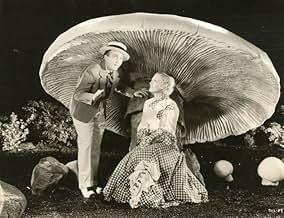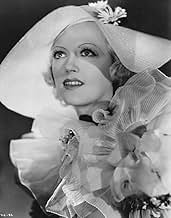A love-struck teacher pursues a radio singer to Hollywood.A love-struck teacher pursues a radio singer to Hollywood.A love-struck teacher pursues a radio singer to Hollywood.
- Director
- Writers
- Stars
- Awards
- 3 wins & 1 nomination total
The Radio Rogues
- The Radio Rogues
- (as Three Radio Rogues)
Sam Appel
- Mexican Bartender
- (uncredited)
Henry Armetta
- Henry Armetta
- (archive footage)
- (uncredited)
Eddie Bartell
- Member - Three Radio Rogues
- (uncredited)
Wallace Beery
- Wallace Beery - Premiere Clip
- (archive footage)
- (uncredited)
Clara Blandick
- Miss Perkins - Divinity Teacher
- (uncredited)
Harry Bowen
- Bartender
- (uncredited)
Nora Cecil
- Briarcroft's Teacher
- (uncredited)
Onest Conley
- Tap Dancer
- (uncredited)
Ken Darby
- Member - The King's Men
- (uncredited)
Jon Dodson
- Member - The King's Men
- (uncredited)
- Director
- Writers
- All cast & crew
- Production, box office & more at IMDbPro
Featured reviews
Bing Crosby truly was the quintessential vocalist of his time. I strongly recommend Gary Giddins bio on Bing; an excellent reference.
Anyway, the story may be weak in this film, but the songs and Bing's clear baritone voice make up for it.
An interesting tidbit about this film: Of course Marion Davies was W.R. Hearst's mistress, and Hearst financed the film. Ms. Davies thus took full advantage of the situation by showing up for filming at 10 AM, shooting a scene or two before a four hour lunch replete with all the catered trimmings and wines. The day wound down by 4PM.
It's no wonder it took six months to shoot this film in an era when the typical film was shot in 2 weeks!
Anyway, the story may be weak in this film, but the songs and Bing's clear baritone voice make up for it.
An interesting tidbit about this film: Of course Marion Davies was W.R. Hearst's mistress, and Hearst financed the film. Ms. Davies thus took full advantage of the situation by showing up for filming at 10 AM, shooting a scene or two before a four hour lunch replete with all the catered trimmings and wines. The day wound down by 4PM.
It's no wonder it took six months to shoot this film in an era when the typical film was shot in 2 weeks!
I watched this movie because I wanted to see what Marion Davies could do in a comedy, which is supposedly what she did best. She was an attractive woman, with - at least on screen - a pleasant, unpretentious personality, so I figured she might indeed do well in comedy.
But this script, by the much admired David Ogden Stewart, gives her nothing to work with. She delivers her lines ok, but the lines are so uninteresting that I don't know what Helen Hayes could have done with them.
Davies has to dance, and she's passable but no better. But then, no worse than Crawford or some other actresses of the era who were given dance numbers. Davies has to sing, and again, she's not bad, but nothing special.
In short, this movie doesn't make a case for Davies as an actress in comedy. It doesn't make her look bad, but it doesn't make you think she was a great comedian, either.
For me, the best thing, the only really good thing, in this movie was Bing Crosby's delivery of some of his musical numbers, in particular *Temptation*, a great song that he brings off very well. The other musical numbers, like the script, are bland and forgettable.
I'm surprised that Hearst, with all his money and power, couldn't have seen to it that Davies had better material. But then, perhaps the problem was not with her but with him: maybe he couldn't tell if a movie script was good or bad and imposed bad ones on her.
But this script, by the much admired David Ogden Stewart, gives her nothing to work with. She delivers her lines ok, but the lines are so uninteresting that I don't know what Helen Hayes could have done with them.
Davies has to dance, and she's passable but no better. But then, no worse than Crawford or some other actresses of the era who were given dance numbers. Davies has to sing, and again, she's not bad, but nothing special.
In short, this movie doesn't make a case for Davies as an actress in comedy. It doesn't make her look bad, but it doesn't make you think she was a great comedian, either.
For me, the best thing, the only really good thing, in this movie was Bing Crosby's delivery of some of his musical numbers, in particular *Temptation*, a great song that he brings off very well. The other musical numbers, like the script, are bland and forgettable.
I'm surprised that Hearst, with all his money and power, couldn't have seen to it that Davies had better material. But then, perhaps the problem was not with her but with him: maybe he couldn't tell if a movie script was good or bad and imposed bad ones on her.
'Going Hollywood's' biggest attraction was Bing Crosby, who had one of the most beautiful and distinctive male (and in general) singing voices on film, as well as being a master of how to use it.
Crosby is certainly the best thing about 'Going Hollywood'. He seems relaxed, has a lot of charm and looks and sounds wonderful, his beautiful smooth voice used with impeccable phrasing and control as always. Great songs also helps, something that 'Going Hollywood' certainly has, the standouts being the title song, "Temptation" and "Beautiful Girl".
Of the production numbers, choreographically the best is the train station sequence which is so lively and entertaining. Although Raoul Walsh did seem a bit of an odd choice at first as director, often going for the tougher and darker edge to his films, but he does direct with a light touch without being too lightweight. Really enjoyed Patsy Kelly, who brings plenty of sass and allure. While going on a little too long, the Three Radio Rogues are also entertaining, and while overlong and overblown parts of the dream sequence are quite sweet.
However, was very much mixed on Marion Davies. She is attractive and does bring some charm and fun, but at other points she does look stiff and limitations in her singing and dancing show. Stuart Erwin has an appealing earnestness but has little to do, while Ned Sparks does smarmy well but the character is written with so little variation that it feels one-dimensional. Worst of all is Fifi D'Orsay, her character being an annoying cartoonish caricature made even more insufferable by that D'Orsay overacts to such a wild degree.
While some of the dream sequence was quite nice, the dancing scarecrows part does feel really bizarre and also jars. The bit with the blackface is neither cute or funny and even those who hardly ever scream racism will find it in bad taste. The script has some wit, but is also shallow and flaccid. The story while at first lively in pace constantly feels too convenient and too neatly wrapped up, while also dragging towards the end, having a premise and romance that rarely rings true and being paper thin. Characterisation is even thinner, development practically forgotten about.
All in all, many charms but also some big caveats. 5/10 Bethany Cox
Crosby is certainly the best thing about 'Going Hollywood'. He seems relaxed, has a lot of charm and looks and sounds wonderful, his beautiful smooth voice used with impeccable phrasing and control as always. Great songs also helps, something that 'Going Hollywood' certainly has, the standouts being the title song, "Temptation" and "Beautiful Girl".
Of the production numbers, choreographically the best is the train station sequence which is so lively and entertaining. Although Raoul Walsh did seem a bit of an odd choice at first as director, often going for the tougher and darker edge to his films, but he does direct with a light touch without being too lightweight. Really enjoyed Patsy Kelly, who brings plenty of sass and allure. While going on a little too long, the Three Radio Rogues are also entertaining, and while overlong and overblown parts of the dream sequence are quite sweet.
However, was very much mixed on Marion Davies. She is attractive and does bring some charm and fun, but at other points she does look stiff and limitations in her singing and dancing show. Stuart Erwin has an appealing earnestness but has little to do, while Ned Sparks does smarmy well but the character is written with so little variation that it feels one-dimensional. Worst of all is Fifi D'Orsay, her character being an annoying cartoonish caricature made even more insufferable by that D'Orsay overacts to such a wild degree.
While some of the dream sequence was quite nice, the dancing scarecrows part does feel really bizarre and also jars. The bit with the blackface is neither cute or funny and even those who hardly ever scream racism will find it in bad taste. The script has some wit, but is also shallow and flaccid. The story while at first lively in pace constantly feels too convenient and too neatly wrapped up, while also dragging towards the end, having a premise and romance that rarely rings true and being paper thin. Characterisation is even thinner, development practically forgotten about.
All in all, many charms but also some big caveats. 5/10 Bethany Cox
Sylvia Bruce (Marion Davies) is a bored French teacher but after hearing the melodious sounds of the famous Bill Williams (Bing Crosby) on the radio, she is so inspired she leaves her job and seeks her dream.
Going Hollywood is a rather odd movie as there is the disturbing fact that Marion Davies' character is practically a stalker who insists that their love is meant to be. I can usually accept the fact that it's just a movie - it doesn't have to be realistic, but I just felt her character was a bit of a nut case. I hate to say it but Davies is most unconvincing and it is almost painful to see her scenes. I was disappointed to see this because she was magnificent in silents. That being said, Marion is undoubtedly gorgeous and has a few good moments (and she's not a bad dancer too)... but not nearly enough as there should be.
It is evident that Bing Crosby and the music are the real stars of this picture. He steals every scene from Davies with effortless delivery. The music - especially "Temptation", "Going Hollywood" and "Beautiful Girl" are absolutely delightful little tunes and make the movie well worth watching.
Overall, a bizarre and often tedious movie and Davies isn't at her best. However handsome crooner Bing Crosby and the fantastic music by Arthur Freed and Herb Brown steal the show and make it watchable. Does not compare to the other musicals of this period.
Going Hollywood is a rather odd movie as there is the disturbing fact that Marion Davies' character is practically a stalker who insists that their love is meant to be. I can usually accept the fact that it's just a movie - it doesn't have to be realistic, but I just felt her character was a bit of a nut case. I hate to say it but Davies is most unconvincing and it is almost painful to see her scenes. I was disappointed to see this because she was magnificent in silents. That being said, Marion is undoubtedly gorgeous and has a few good moments (and she's not a bad dancer too)... but not nearly enough as there should be.
It is evident that Bing Crosby and the music are the real stars of this picture. He steals every scene from Davies with effortless delivery. The music - especially "Temptation", "Going Hollywood" and "Beautiful Girl" are absolutely delightful little tunes and make the movie well worth watching.
Overall, a bizarre and often tedious movie and Davies isn't at her best. However handsome crooner Bing Crosby and the fantastic music by Arthur Freed and Herb Brown steal the show and make it watchable. Does not compare to the other musicals of this period.
One of the other reviewers said that this film was essentially about stalking. I had never thought of it in those terms, but it's true.
Marion Davies is a love starved French teacher at a girl's boarding school who's spare hours are taken up with the radio crooning of Bing Crosby. She follows the object of her affection out to Hollywood and in Hollywood cliché style gets her big break in the movies.
First if you're willing to accept the beautiful Marion Davies with this crowd of old spinsters at the boarding school then the rest of the plot simply follows. Second for Bing Crosby fans one has to remember that this is NOT a Crosby picture. He's the leading man in a Marion Davies film. Everyone is familiar with William Randolph Hearst and the Svengali like influence he had on her career. Marion's making a musical so you go out and buy the hottest singer currently as her leading man. And that, boys and girls, is the story of Bing's first film away from Paramount.
You also hire a topflight director in Raoul Walsh to keep things at a brisk pace. And you give Marion a good supporting cast that includes Fifi D'Orsay, Ned Sparks, Stu Erwin, and Patsy Kelly. Mix 'em together and you got Going Hollywood.
It's not a bad mix. Crosby had a lot of songs in this film. The big hit was Temptation, but there were other good ones from Nacio Herb Brown and Arthur Freed. One thing however, since this was not Paramount and MGM was known for the great production numbers in their films, Bing got some great numbers. I'm surprised frankly that Hearst allowed Crosby a huge number like the title tune, set in Grand Central Station, without Davies in it. Davies does join him in a dream sequence where she sings a couple of lines of We'll Make Hay While The Sun Shines with Marion and Bing dressed as a pair of Grand Wood rustics. Another big production number that Paramount would never spend the money for.
Davies had good if limited talents. Hearst however could only see her as a pure heroine. Since he discovered her in the Ziegfeld Follies, Davies's dancing should be no surprise. It's at least as good as Ruby Keeler's. She had a good gift for mimicry, her imitation of Fifi D'Orsay is a key point in the plot. One thing that would be considered in god-awful taste now is her donning black-face to get on Bing's movie set and imitating the dialect.
It's funny though. Think about pictures like Play Misty For Me and The Fan made two generations later. Stalking was looked on entirely differently back in those more innocent days.
Marion Davies is a love starved French teacher at a girl's boarding school who's spare hours are taken up with the radio crooning of Bing Crosby. She follows the object of her affection out to Hollywood and in Hollywood cliché style gets her big break in the movies.
First if you're willing to accept the beautiful Marion Davies with this crowd of old spinsters at the boarding school then the rest of the plot simply follows. Second for Bing Crosby fans one has to remember that this is NOT a Crosby picture. He's the leading man in a Marion Davies film. Everyone is familiar with William Randolph Hearst and the Svengali like influence he had on her career. Marion's making a musical so you go out and buy the hottest singer currently as her leading man. And that, boys and girls, is the story of Bing's first film away from Paramount.
You also hire a topflight director in Raoul Walsh to keep things at a brisk pace. And you give Marion a good supporting cast that includes Fifi D'Orsay, Ned Sparks, Stu Erwin, and Patsy Kelly. Mix 'em together and you got Going Hollywood.
It's not a bad mix. Crosby had a lot of songs in this film. The big hit was Temptation, but there were other good ones from Nacio Herb Brown and Arthur Freed. One thing however, since this was not Paramount and MGM was known for the great production numbers in their films, Bing got some great numbers. I'm surprised frankly that Hearst allowed Crosby a huge number like the title tune, set in Grand Central Station, without Davies in it. Davies does join him in a dream sequence where she sings a couple of lines of We'll Make Hay While The Sun Shines with Marion and Bing dressed as a pair of Grand Wood rustics. Another big production number that Paramount would never spend the money for.
Davies had good if limited talents. Hearst however could only see her as a pure heroine. Since he discovered her in the Ziegfeld Follies, Davies's dancing should be no surprise. It's at least as good as Ruby Keeler's. She had a good gift for mimicry, her imitation of Fifi D'Orsay is a key point in the plot. One thing that would be considered in god-awful taste now is her donning black-face to get on Bing's movie set and imitating the dialect.
It's funny though. Think about pictures like Play Misty For Me and The Fan made two generations later. Stalking was looked on entirely differently back in those more innocent days.
Did you know
- TriviaWhen Marion Davies requested Bing Crosby as her leading man for this film, he was under contract to Paramount, where they had him starring in shorts and a series of college themed films with Jack Oakie. The success of this film moved Crosby into starring roles at Paramount with the likes of Carole Lombard and Miriam Hopkins, a definite step upwards.
- Quotes
Bill 'Billy' Williams: [singing] Out where they say, "Let us be gay," I'm going Hollywood. I'll ballyhoo greetings to you, I'm going Hollywood. Hey, while you sleepyheads are in that hay, I'll be dancing - I'm gonna be dancing with a sun-kissed baby. And I'm on my way - here's my beret, I'm going Hollywood!
- ConnectionsEdited into The Big Idea (1934)
- SoundtracksGoing Hollywood
(1933) (uncredited)
Music by Nacio Herb Brown
Lyrics by Arthur Freed
Played during the opening credits
Sung by Bing Crosby at the railroad station
Played as background music twice
Details
- Release date
- Country of origin
- Official site
- Languages
- Also known as
- Going Hollywood
- Filming locations
- Production companies
- See more company credits at IMDbPro
Box office
- Budget
- $914,000 (estimated)
- Runtime
- 1h 18m(78 min)
- Color
- Aspect ratio
- 1.37 : 1
Contribute to this page
Suggest an edit or add missing content

